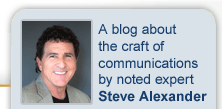We are not our audience!
We have the tendency to think of others from our own world view, in other words, when we think about the messages we believe our organizations need to communicate, we get caught up in our own world, our internal language and what we know. We forget – most of those with whom we come in contact everyday do not share our experiences, including education, opportunity, social and family background, culture, you name it. As a result, we communicate from where we feel comfortable and are knowledgeable and experienced. As a result, we don’t reach or connect with our audience.
To reach an audience of customers, citizens, taxpayers, employees, patients, whomever your audience might be, the most effective communications start with getting out of our own parochialism. Tough to do when you’re used to using certain language, acronyms and images every day in your own work world.
Clients often ask us, “Why can’t we just tell them how important this is?” Well, that’s great if you have unlimited resources and can populate every place they get information in a non-stop, consistent way with what you think should be important to them! Even then you’re unlikely to get them to pay attention.
Ask yourself this simple question, “What was the last TV commercial I remember, including the product, the message and images?” Yet, here’s where companies spend a small fortune seeking your attention and, as my friend and colleague, Dan Kully of Laguens Kully Klose Partners always reminds me, have done some of the most extensives audience research on the planet. Tough to remember that last commercial, huh? And you’re probably even saying to yourself, “I don’t even watch that much TV!” Ah, and that makes you quite unlike your audience… your employees, customers, patients, etc.
Just check some of the statistics on how much TV people watch and that alone will give you a little clue. According to the A.C. Nielsen Co., the Americans watch more than four hours of TV each day (or 28 hours/week, or two months of nonstop TV-watching per year). For the average 65-year old, that’s about nine years of their life. This is not a discussion pro or con for TV watching, just pointing out that if those are not your habits, then by the same token, you’re not like most of your audiences.
Your assignment this week: Make a list of all the acronyms you use in your industry, profession, etc. and when you’re at your favorite restaurant, retail store or wherever you can ask the question without getting arrested, ask your server, clerk, etc. what the acronyms mean; just limit your self to about five of them. I think you can anticipate the results.
So, next time you and your organization decide you want to talk to the public, your audience, invest some time in asking who they are, where they come from ideologically, experientially, culturally, economically, etc. Get out of your own comfort zone, your own space. You’ll be surprised at the result.
Let me know what you learn and how you do. Especially with your assignment!




